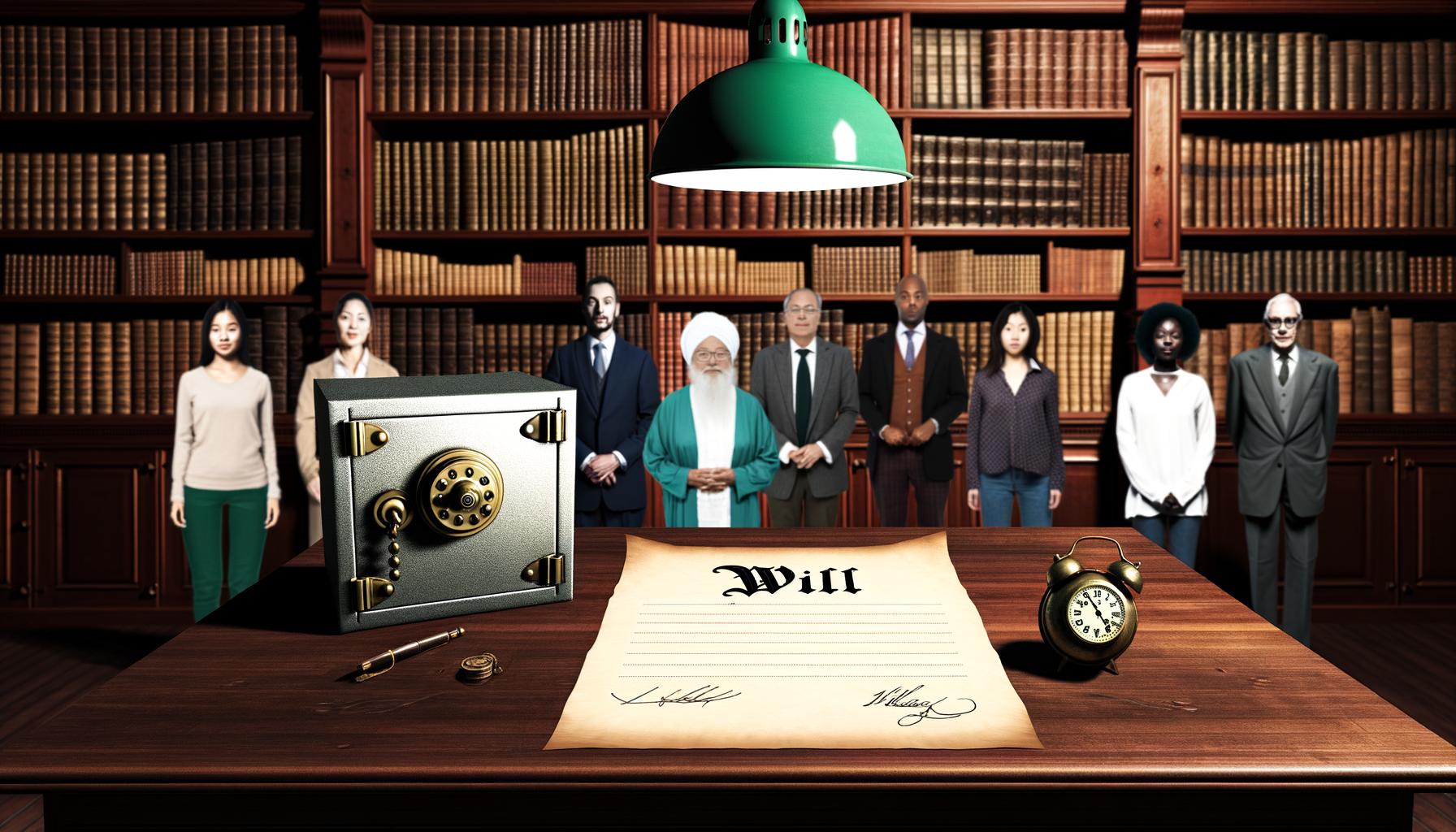Estate planning, encompassing the strategic use of wills and trusts, is a critical aspect that every adult should consider, regardless of age or financial status. Ensuring that your assets are distributed according to your wishes while providing security and clarity for your loved ones can offer immense peace of mind. Wills and trusts serve dual purposes-not only safeguarding your wealth but also mitigating potential family conflicts during times of emotional stress.
For residents of Stanton, the benefits of establishing a well-thought-out estate plan are manifold. Beyond the general advantages of protecting family assets and ensuring desired distribution, there are specific perks relevant to the local community. Timely preparation aids in adhering to regional laws and regulations, ultimately streamlining the process for all involved parties. Families in Stanton can avoid arduous legal battles and guarantee that their hard-earned assets remain protected through efficient estate planning mechanisms.
Moreover, everyone stands to gain from the security an estate plan brings; it isn’t just reserved for those with substantial wealth. In the unfortunate event of sudden illness or death, having predefined plans allows for a smooth transition and sustenance of family harmony.
With tools like wills to assign guardianship for minors or trusts that provide ongoing financial management, Stanton residents can anticipate potential issues before they arise. Thus, making informed choices today paves the way for a stable tomorrow.
Understanding Wills
A will, often referred to as a “last will and testament,” is an essential legal document that outlines how a person’s assets should be distributed after their death. Its primary function is to ensure that the deceased’s wishes are honored and to provide clarity for surviving family members during a challenging time. Wills can address various aspects of an estate, including property distribution, guardianship of minor children, and specific bequests to individuals or charitable organizations.
There are several types of wills that residents of Stanton might consider. A simple will, which is the most common form, straightforwardly lays out who should inherit what. Joint wills are typically created by married couples and outline how assets will be handled upon the death of either spouse. A living will, meanwhile, doesn’t deal with asset distribution but provides instructions for medical care preferences if the individual becomes incapacitated and can’t communicate their wishes.
One key advantage of having a carefully drafted will is the ability to name guardians for minor children. This ensures that in the event both parents pass away, their children are cared for by trusted individuals rather than leaving this critical decision up to a court.
Additionally, specifying funeral arrangements in a will can alleviate stress for bereaved family members who would otherwise have to make these decisions themselves during an emotionally taxing time. By clearly detailing these elements within your estate planning documents, you can create peace of mind knowing that your wishes will be followed and your loved ones adequately protected.
- Simple Will: Straightforward asset distribution.
- Joint Will: Typically used by married couples.
- Living Will: Medical care instructions if incapacitated.
Trusts
A trust is a fiduciary arrangement where one party, known as the trustee, holds and manages assets on behalf of another party, referred to as the beneficiary. Unlike wills, which only take effect after your death, trusts can be utilized during your lifetime or after it.
This flexibility allows Stanton residents to manage their estate efficiently while they are still alive and ensures a smooth transfer of assets thereafter. Trusts come in various forms, each tailored to specific needs and situations.
One common type is the living trust, also called an inter vivos trust. This kind of trust becomes effective while you are still alive and enables you to actively manage your assets within the trust. Alternatively, there are irrevocable trusts that once established cannot be altered or revoked without the beneficiary’s consent.
These are often used for estate tax reduction because the assets funded into an irrevocable trust are generally not considered part of your taxable estate. Testamentary trusts, set up through a will, become operative only upon your death.

The benefits of utilizing trusts in estate planning can be extensive for Stanton residents. For instance:
- Avoiding Probate: Assets transferred into a living trust do not go through probate court, which can save time and potentially high legal costs.
- Reducing Estate Taxes: Irrevocable trusts can help minimize taxable estate values.
- Maintaining Privacy: Unlike wills that become public records through probate proceedings, trusts offer greater privacy since their terms do not have to be disclosed publicly.
Understanding these categories and functionalities is vital when preparing wills and trusts as part of your estate planning efforts in Stanton.
The Legal Process
Initial Consultation With Estate Planning Professionals
The first essential step in creating your will or trust is to consult with an experienced estate planning attorney. Stanton residents can access specialized legal services that guide them through the intricacies of drafting these crucial documents. During the initial consultation, the attorney will evaluate your unique circumstances, including financial status, family composition, and personal wishes.
This comprehensive assessment ensures that every aspect of your estate is meticulously planned to reflect your intentions. In addition to lawyers, you may also seek advice from financial advisors and tax consultants who can provide expertise on how best to structure your assets.
Drafting the Necessary Documents
Once you’ve consulted professionals, the next step involves drafting the actual documents-wills and trusts-that form the backbone of your estate plan. The process starts with compiling all necessary information such as a list of assets, debts, beneficiaries, and any specific instructions you wish to include. For wills, key elements include appointing executors who will manage asset distribution and naming guardians for minor children.
Trusts require setting out terms identifying trustees who have a fiduciary responsibility to manage or distribute trust assets according to the stipulated guidelines. Both documents must comply with state-specific legal requirements to be valid and enforceable.
Review and Finalization
After drafting comes the critical stage of reviewing all components of your will or trust meticulously. It’s vital to ensure there are no ambiguities or discrepancies in these documents that could lead to future disputes among beneficiaries or misinterpretation during execution. Your estate planning attorney will help you refine language for clarity and precision.
Once reviewed, the final step involves signing these documents in the presence of required witnesses or notaries as mandated by Stanton’s legal statutes. Importantly, safeguards like secure storage for original copies ensure they can be easily accessed when needed.
Navigating through each of these phases with professional assistance provides peace of mind by confirming that your estate plans effectively safeguard your assets and honor your wishes. The investment in creating well-structured wills and trusts pays dividends by minimizing potential family conflicts and ensuring a seamless transfer of wealth across generations within Stanton’s dynamic community framework.
Common Mistakes to Avoid in Estate Planning
One of the most prevalent mistakes people make when preparing wills and trusts is failing to update their estate plans regularly. Life events such as marriages, divorces, births, and deaths significantly impact how your assets should be distributed among heirs.
Without periodic reviews and necessary adjustments to your estate planning documents, you risk creating discrepancies that could lead to family disputes or even legal challenges. Stanton residents, like everyone else, must remember that an out-of-date will or trust can render your intentions null and potentially complicate the probate process.
Another common error involves not being clear and specific enough in your estate planning documents. Ambiguous language can lead to interpretations that may not align with your actual wishes. For example, simply stating “I leave my house to my children” without specifying which child gets what part can create unnecessary contention among beneficiaries.
This is particularly important for residents of Stanton who own multiple properties or have complex familial relationships. Working closely with a qualified estate planning attorney can ensure that every clause is detailed and leaves no room for misunderstandings.

Many people also overlook the importance of appointing reliable executors or trustees to handle their estates. The individuals tasked with executing wills and trusts play critical roles in ensuring that your wishes are carried out accurately and efficiently. Choosing someone who lacks the requisite skills or reliability can lead to delays, mismanagement of assets, or even legal battles among heirs. Stanton residents would benefit from considering both professional fiduciaries and trusted family members when deciding on executors or trustees.
| Mistake | Consequence |
|---|---|
| Failing to update estate plans | Family disputes and legal challenges |
| Lack of specificity in documents | Ambiguity leading to misinterpretations |
| Poor choice of executor/trustee | Delays and potential mismanagement of assets |
Benefits of Estate Planning for Stanton Residents
Estate planning is not merely a legal formality; it is a critical step in ensuring that one’s assets and wishes are honored after passing away. For Stanton residents, the importance of a meticulously prepared estate plan cannot be overstated.
One of the most significant benefits is the protection and smooth transition of family assets. An efficiently structured estate plan can help shield your wealth from excessive taxes and probate fees, ensuring that more of your hard-earned money goes directly to your heirs or designated beneficiaries.
Uniquely tailored local considerations are another compelling reason for Stanton inhabitants to prioritize estate planning. State-specific regulations in California often necessitate specific elements within wills and trusts to comply with legal requirements effectively. Understanding regional laws with the assistance of knowledgeable professionals familiar with Stanton’s statutes can forestall potential legal challenges and complications. This level of customization ensures that your plans hold up under scrutiny, providing peace of mind that your intentions will be carried out as envisioned.
Achieving clarity in how one’s estate will be managed can prevent familial disputes and ensure harmony among surviving relatives. Specificity in documents pertaining to wills and trusts mitigates ambiguities that may lead to misunderstandings or contention.
Moreover, regularly updating these documents as life circumstances change-whether through marriage, birth of children, or divorce-is vital for reflecting current wishes accurately. In doing so, Stanton residents create a legacy characterized not only by material wealth but also by thoughtful consideration and care for their loved ones.
| Benefit | Description |
|---|---|
| Asset Protection | Shields wealth from taxes and probate fees. |
| Legal Compliance | Ensures adherence to California/Staton-specific laws. |
| Avoids Disputes | Provides clear directives to prevent family conflicts. |
Local Resources and Support in Stanton
When it comes to the meticulous process of preparing wills and trusts, having access to local resources can make a significant difference. Stanton residents are fortunate to have a number of reputable estate planning attorneys and firms right in their community who specialize in wills and trusts.
These professionals offer services ranging from basic will drafting to complex trust structures that cater to your specific needs. Engaging with a local attorney means you benefit from their awareness of regional laws and potential considerations unique to Stanton.
Workshops, Seminars, and Community Resources
Education is a crucial component of effective estate planning. Thankfully, Stanton has several workshops and seminars that aim to educate the public about the importance of wills and trusts.
Organizations often host free or low-cost events where experienced estate planners discuss various aspects such as how to protect your assets, reduce taxes, or ensure a smooth transition for your heirs. Additionally, community centers frequently offer informative sessions dedicated specifically to addressing the needs of seniors, parents with minor children, or business owners.
Legal Aid Organizations
For those who may require financial assistance but still need comprehensive estate planning, Stanton has several legal aid organizations willing to help. These organizations provide pro bono or reduced-cost legal assistance for lower-income individuals who need help with drafting wills and trusts.
The importance of these services cannot be overstated; they ensure that everyone in the community can access essential legal support regardless of their financial situation. Contacting local legal aid can be an excellent first step if you’re unsure where to begin in your estate planning journey.

Residents looking for specialized support should start by consulting these invaluable local resources which collectively contribute toward making Stanton an ideal environment for diligent estate planning.
Conclusion
In summary, estate planning is a crucial task that everyone should undertake, regardless of age or wealth. As discussed, the roles of wills and trusts are fundamental to ensuring your assets are distributed according to your wishes and that your family is taken care of after you’re gone. For Stanton residents, preparing these documents not only means securing a smooth transition but also protecting family assets from potential legal disputes and excessive taxes.
It’s important to remember that creating a comprehensive estate plan isn’t a one-time event but rather an ongoing process. Life changes such as marriage, the birth of children, or divorce necessitate updates to your wills and trusts to ensure they reflect your current circumstances and intentions.
Sutton’s local resources, including experienced estate planning attorneys and community workshops, can provide invaluable guidance in this complex area. Leveraging these resources can help you avoid common pitfalls such as ambiguity in documentation or the failure to update plans over time.
So why wait? Take the first step today by scheduling a consultation with an estate planning professional or attending an educational seminar offered in Stanton. Time invested now will pay off immensely for both you and your loved ones in the future. Estate planning might seem daunting initially, but with the right support and information at hand, you can achieve peace of mind knowing that everything is well-planned for any eventuality.
Frequently Asked Questions
Why Is a Trust Better Than a Will?
A trust is often considered better than a will because it allows for the direct transfer of assets without the need for probate, which can be time-consuming and expensive. Trusts also provide greater privacy since they are not public records, unlike wills that go through probate court.
Additionally, trusts can offer more control over how and when assets are distributed to beneficiaries, including during the grantor’s lifetime if a living trust is utilized.
What Is the Major Disadvantage of a Trust?
The major disadvantage of a trust is its complexity and cost to set up and maintain. Establishing a trust requires legal assistance, which can be expensive due to attorney fees.
Furthermore, managing a trust may require ongoing administrative work to ensure that all assets are properly titled under the trust and comply with relevant laws. This level of complexity can be burdensome for some individuals compared to simply drafting a will.
What Are Reasons to Not Have a Trust?
There are several reasons one might choose not to have a trust. If an individual’s estate is straightforward or relatively small in value, the cost and complexity of setting up a trust might outweigh its benefits.
In such cases, a simple will may adequately address their estate planning needs at a lower cost and with less hassle. Additionally, certain types of property or assets might not benefit from being placed into a trust, making it less advantageous as an estate planning tool.
What Is the Biggest Mistake Parents Make When Setting Up a Trust Fund?
One significant mistake parents make when setting up a trust fund is failing to clearly define the terms and conditions under which the funds should be distributed. Vague instructions can lead to confusion or disputes among beneficiaries and trustees about how the money should be used or distributed over time.
Properly detailed guidelines ensure that the parents’ intentions are honored and help prevent potential conflicts among family members related to the administration of the trust.
What Type of Will Is Best?
The best type of will depends on individual circumstances but generally encompasses comprehensiveness and clarity regarding asset distribution wishes and guardianship preferences for minor children if applicable. For most people in uncomplicated situations, a straightforward “simple will” suffices as long as it meets legal requirements in their jurisdiction and explicitly states their wishes clearly.
In more complex situations involving significant assets or blended families, consulting an attorney to create a detailed will (or even considering supplemental documents like trusts) may offer more tailored solutions that align closely with specific goals.

